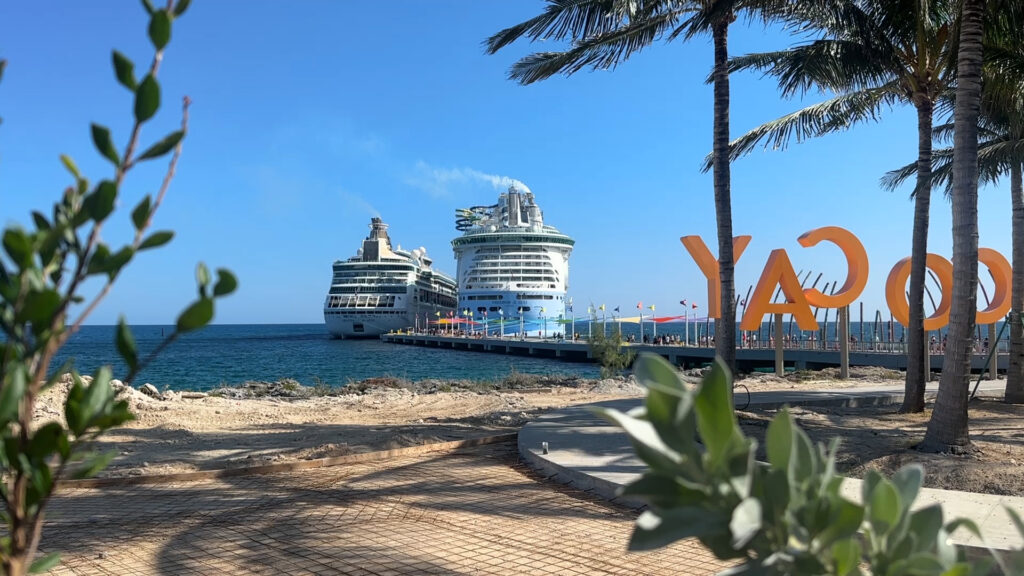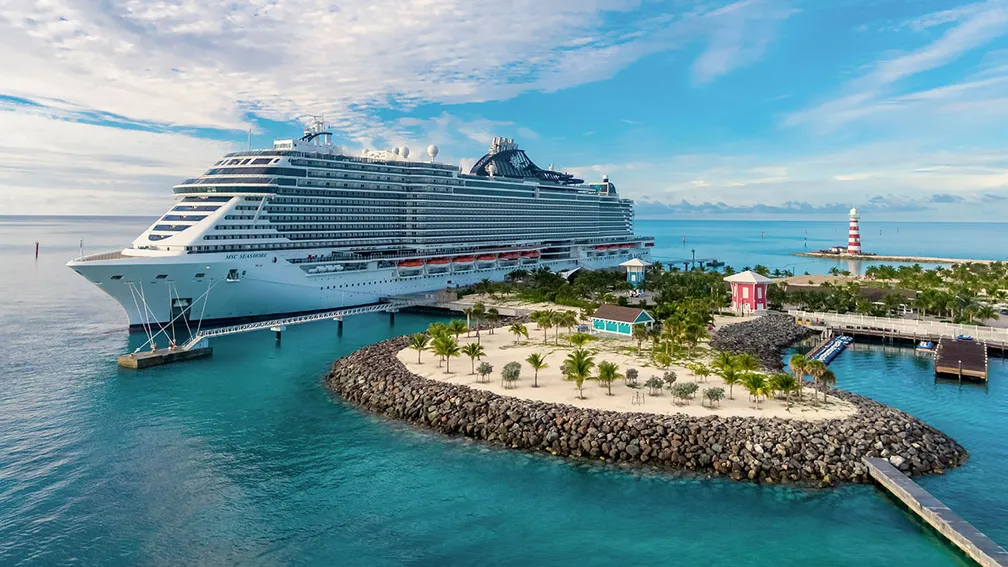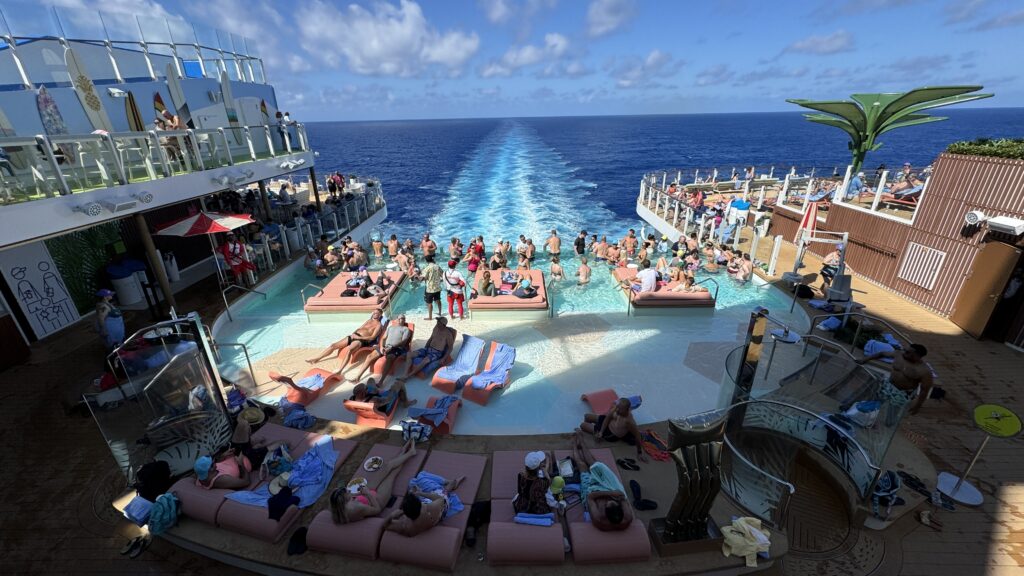Let’s talk about the SECRETS of Travel Insurance. One of the most frequent questions I get is about the necessity of travel insurance. And I tell people, look – you humans are fragile. And things happen. Life is unpredictable! Travel insurance can provide financial protection against unexpected travel disruptions, medical emergencies, and lost belongings. Here are a few real-life examples of people who went on a cruise without travel insurance and regretted it due to unexpected situations:
1. Medical Emergency at Sea – $88,000 Bill
📍 Caribbean Cruise
A couple was enjoying their honeymoon cruise when the husband suffered a heart attack. The ship’s medical team stabilized him, but he needed to be airlifted to a hospital in the nearest port. Because they didn’t have travel insurance, they had to pay:
- $20,000 for onboard medical care
- $68,000 for emergency evacuation
💡 Why Insurance Would Have Helped: Emergency medical evacuation coverage would have paid for the airlift and hospital treatment.
2. Missed Cruise Departure – $5,000 Lost
📍 Alaska Cruise
A family of four had a flight delay due to bad weather, causing them to miss the cruise departure. The cruise line refused to refund their tickets, and they had to book last-minute flights to the next port at their own expense.
💰 Out-of-Pocket Costs:
- $5,000 for rebooking flights and hotels at the next port
💡 Why Insurance Would Have Helped: “Missed connection” coverage would have reimbursed them for flights and accommodations.
3. Norovirus Outbreak – $2,500 in Extra Costs
📍 Mediterranean Cruise
A passenger caught norovirus onboard and had to quarantine in their cabin for five days. Because of this, they:
- Missed prepaid shore excursions
- Had to book a new flight home due to travel restrictions
💰 Out-of-Pocket Costs:
- $1,500 lost in non-refundable excursions
- $1,000 for last-minute flight changes
💡 Why Insurance Would Have Helped: “Trip interruption” and “travel delay” coverage would have reimbursed them for these losses.
4. Ship Skips a Port – No Refund for Prepaid Tours
📍 Bahamas Cruise
A group of friends pre-booked an expensive scuba diving excursion ($1,200 total). Unfortunately, due to rough seas, the cruise line canceled that port stop. The tour operator refused to issue a refund, and they were out of luck.
💡 Why Insurance Would Have Helped: “Cancel for Any Reason” (CFAR) coverage or trip interruption insurance might have covered non-refundable prepaid activities.
5. Lost Luggage – Stuck Without Clothes for 5 Days!
📍 Hawaii Cruise
A traveler’s checked luggage was lost by the airline en route to the cruise departure city. The cruise left before the airline could deliver the bags, leaving the traveler without clothes or essentials for five days.
💰 Out-of-Pocket Costs:
- $600 spent on clothing, toiletries, and shoes onboard
💡 Why Insurance Would Have Helped: “Baggage delay” coverage would have reimbursed them for necessary purchases.
6. Injury on a Shore Excursion – $30,000 in Hospital Bills
📍 Mexico Cruise
A passenger went on an ATV excursion in Cozumel and crashed, suffering a broken leg. The cruise left without them, and they had to get treatment at a local hospital. Their U.S. health insurance did not cover foreign medical expenses, leaving them with a $30,000 bill.
💡 Why Insurance Would Have Helped: Travel medical insurance would have covered hospital bills and arranged a flight home.
7. Hurricane Cancels Cruise – No Refund
📍 Caribbean Cruise
A couple’s cruise was canceled due to an approaching hurricane, but the cruise line only offered credit for a future trip, not a refund. The couple had non-refundable flights and hotel stays booked before the cruise.
💰 Out-of-Pocket Costs:
- $2,000 lost in flights and hotels
💡 Why Insurance Would Have Helped: “Trip cancellation” coverage would have provided a cash refund instead of just cruise credit.
Moral of the Story
🚢 If you’re cruising, travel insurance is worth considering, especially for:
- Medical emergencies (costly at sea or abroad)
- Flight delays or missed connections
- Lost luggage or valuables
- Unexpected trip cancellations or interruptions
Would you like recommendations for cruise-specific travel insurance policies? 😊
Do You Need Travel Insurance?
So, should you buy travel insurance? Well, it depends. I am not a lawyer, and this is generic information and not advice. Talk with a licensed insurance agent or lawyer if you really want a professional opinion.
But here are my thoughts as a fellow traveler. If you’re 20-something and live in a rundown rental and your car payment is twice more than your rent, many probably risk skipping it. I did. Or, if you spend more time in the casino than the average people and seem to win all the time, well, who knows?
But if you’re in your 40s and own a home and have some assets, wouldn’t you want to protect those?
Here’s a detailed breakdown of what’s covered, including average policy payouts and common limitations. This doesn’t apply to all policies, so READ YOUR POLICY CAREFULLY before making any decisions.
1. Trip Cancellation & Trip Interruption
What it Covers: Reimburses prepaid, non-refundable trip expenses if you have to cancel or cut your trip short due to covered reasons, such as:
- Illness, injury, or death of you, a travel companion, or a family member
- Severe weather (hurricanes, blizzards, etc.)
- Unforeseen work obligations (e.g., military deployment, jury duty)
- Bankruptcy of your airline or travel provider
- Home emergencies (fire, flood, burglary)
Average Payout: Up to 100% of your insured trip cost (varies by policy)
Limitations:
- Must provide documented proof of reason for cancellation.
- Most trip cancellation insurance does NOT cover “change ya mind” cancellations — unless you add Cancel for Any Reason (CFAR) coverage, which typically reimburses 50-75% of trip costs.
2. Travel Medical Insurance
What it Covers: Pays for emergency medical expenses if you get sick or injured while traveling. Includes:
- Hospitalization, doctor visits, ambulance services
- Emergency dental care (usually capped at a lower amount)
Average Payout:
- Emergency medical: $50,000 – $500,000
- Dental: $500 – $1,000
Limitations:
- Pre-existing conditions may not be covered unless you purchase a waiver within a certain timeframe after booking your trip.
- Routine check-ups and elective procedures aren’t covered.
3. Emergency Medical Evacuation & Repatriation
What it Covers:
- Emergency transport to the nearest adequate medical facility if you are seriously ill or injured.
- Medical repatriation (transport back to your home country for treatment).
- Return of remains in case of death.
Average Payout:
- Evacuation: $100,000 – $1,000,000
- Repatriation: $10,000 – $50,000
Limitations:
- Must be deemed medically necessary by the insurance provider.
- May require pre-approval before transport.
- Doesn’t cover transport for minor illnesses or injuries.
4. Baggage & Personal Belongings
What it Covers:
- Reimbursement for lost, stolen, or damaged luggage and personal items.
- Coverage for delayed baggage, allowing you to buy essentials like clothes and toiletries.
Average Payout:
- Lost/stolen baggage: $500 – $3,000 per traveler
- Baggage delay: $100 – $500 (after a delay of 6-24 hours)
Limitations:
- May have per-item limits (e.g., $300 per item, max of $500 for electronics).
- Doesn’t cover cash, credit cards, or high-value jewelry unless explicitly listed.
5. Travel Delay Coverage
What it Covers:
- Covers expenses like hotels, meals, and transportation if your trip is delayed due to:
- Severe weather
- Airline strikes
- Mechanical issues
Average Payout:
- $100 – $300 per day (total max: $500 – $2,000)
Limitations:
- Usually kicks in after a delay of 6-12 hours.
- Must submit receipts for reimbursement.
6. Missed Connection Coverage
What it Covers:
- If you miss a cruise or tour departure due to a covered delay, this covers rebooking costs or accommodations.
Average Payout: $500 – $1,500
Limitations:
- Must prove the delay was outside of your control.
- Usually only covers delays of 3 hours or more.
7. Accidental Death & Dismemberment (AD&D)
What it Covers:
- Provides a lump sum payment if you die or suffer a severe injury (e.g., loss of limb, eyesight) while traveling.
Average Payout: $10,000 – $500,000
Limitations:
- Doesn’t cover death due to illness—only accidents.
- Excludes risky activities like skydiving or scuba diving unless you buy adventure sports coverage.
8. Rental Car Protection (Optional Add-on)
What it Covers:
- Covers damage to a rental car due to an accident, theft, or vandalism.
Average Payout: $25,000 – $100,000
Limitations:
- Doesn’t cover liability insurance (damage to others).
- Some rental companies require you to decline their insurance for your policy to be valid.
Common Exclusions (What’s NOT Covered)
🚫 Alcohol- or drug-related incidents
🚫 Intentional self-harm or reckless behavior
🚫 War, terrorism (varies by policy)
🚫 Traveling against government advisories
🚫 Pregnancy-related issues (unless added coverage)
How Much Does Travel Insurance Cost?
💰 Average cost: 4-10% of total trip cost
For example, if your trip costs $5,000, insurance might cost $200 – $500 depending on coverage levels.
What We Learned and Recommend
Cruise-Sold Insurance
Cruise lines typically earn a commission of 30-50% when they sell travel insurance policies to passengers. Here’s a breakdown of how it works:
- Cruise Line Commission Rates
- 30-50% of the insurance premium goes to the cruise line.
- The remaining 50-70% goes to the insurance provider (e.g., Allianz, Aon Affinity, Travel Guard).
💡 Example: If a cruise line sells a travel insurance policy for $300, they may keep $90-$150 as commission.
- Why Cruise Lines Push Their Own Insurance
- Cruise lines bundle insurance into their booking process to increase revenue.
- Policies sold by cruise lines are often more expensive and less flexible than independent options.
- Their policies may be cruise-focused, meaning they might not cover things like pre-cruise flights, hotels, or independent excursions.
- Better Alternatives?
- Instead of buying insurance directly from the cruise line, you can compare independent travel insurance providers, which often offer:
- Higher medical and evacuation limits
- Better cancellation reasons
- Coverage for pre- and post-cruise expenses
- Instead of buying insurance directly from the cruise line, you can compare independent travel insurance providers, which often offer:
Feel free to adjust any sections or add more details as needed! Let me know if there’s anything else you’d like to include. 😊
Annual Policies
Buying an annual travel insurance policy can be a smart decision if you travel frequently. We saved over $200, got better coverage than the cruise ship policy, and our policy lasts for 365 days and covers as many cruises as we want! Here are some key benefits of purchasing an annual insurance travel policy:
1. Cost Savings
- If you take multiple trips a year, an annual policy is often cheaper than purchasing individual policies for each trip.
2. Convenience
- You don’t have to buy a new policy for every trip—coverage is automatic for all eligible trips within the year.
3. Comprehensive Coverage
- Typically includes trip cancellations, medical emergencies, lost luggage, and travel delays for all trips during the policy period.
4. Emergency Medical Protection
- Covers medical emergencies, evacuations, and hospital stays abroad, which can be very expensive.
5. Covers Multiple Destinations
- Perfect for frequent travelers visiting different countries—one policy covers all destinations (within policy limits).
6. Peace of Mind
- You’re always covered for unexpected events, making travel less stressful and more enjoyable.
7. Protection for Business & Leisure Travel
- Many policies cover both personal and business trips, adding flexibility.
8. Lost or Stolen Belongings Coverage
- Protection for lost luggage, theft, or damage to personal belongings.
9. Covers Adventure Activities (Varies by Policy)
- Some policies include coverage for skiing, scuba diving, or hiking, which single-trip policies might exclude.
10. Better Cancellation & Interruption Coverage
- Some plans provide higher limits for trip cancellations, interruptions, or changes compared to single-trip policies.
An annual travel insurance policy is ideal for frequent travelers who want cost-effective, hassle-free, and continuous coverage throughout the year. Would you like recommendations on specific providers?









